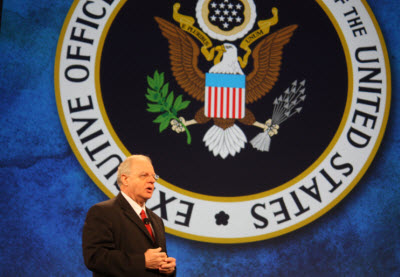 At the RSA security conference in San Francisco today, White House cybersecurity chief Howard Schmidt said that the biggest economic threat facing the nation is the cybersecurity problem.
At the RSA security conference in San Francisco today, White House cybersecurity chief Howard Schmidt said that the biggest economic threat facing the nation is the cybersecurity problem.
He said the government is mobilizing to deal with electronic attacks, which have hit everyone from Google to everyday consumers who have had their identities stolen in credit card scams. (He didn’t dwell on the idea that this is the biggest economic threat; after all, bankers and insurance companies have been pretty big threats to the U.S. economy as well).
In his first major public appearance since President Obama appointed him last year, Schmidt said that the country has to do something about fixing systemic problems that make the nation’s computers vulnerable to cyber attack.
 Government has to go beyond functioning like a “fire department” that puts out fires. The federal agencies in charge of dealing with cybersecurity have been too reactive and haven’t cooperated enough. Schmidt said that in the past nine months, he has tried to pull everyone together in a coherent effort. His job is to coordinate the government’s response across all federal agencies, including defense and civilian operations.
Government has to go beyond functioning like a “fire department” that puts out fires. The federal agencies in charge of dealing with cybersecurity have been too reactive and haven’t cooperated enough. Schmidt said that in the past nine months, he has tried to pull everyone together in a coherent effort. His job is to coordinate the government’s response across all federal agencies, including defense and civilian operations.
Schmidt ticked off a bunch of things that were on President Obama’s to-do list last year, including naming a civil liberties coordinator whose aim is to protect privacy of the citizenry. He recognized that private industry, including entrepreneurs, have a big role to play in upgrading the nation’s defenses.
Some of the work is very basic. Schmidt said there should never be any confusion about who to turn to in the government when an attack happens. He said the government should be set to respond in real-time to threats, not after the fact.
“We have to learn to deal with a moving target because the attacks are always changing,” he said.
And the government should reveal what it knows in the name of transparency, without spilling necessary secrets.
As an example, he said that the White House was declassifying information in its Comprehensive National Cybersecurity Initiative, which was launched in secret in January 2008. It consists of 12 programs that include information about research and development, cyber education, and some details about cyberwarfare issues.


